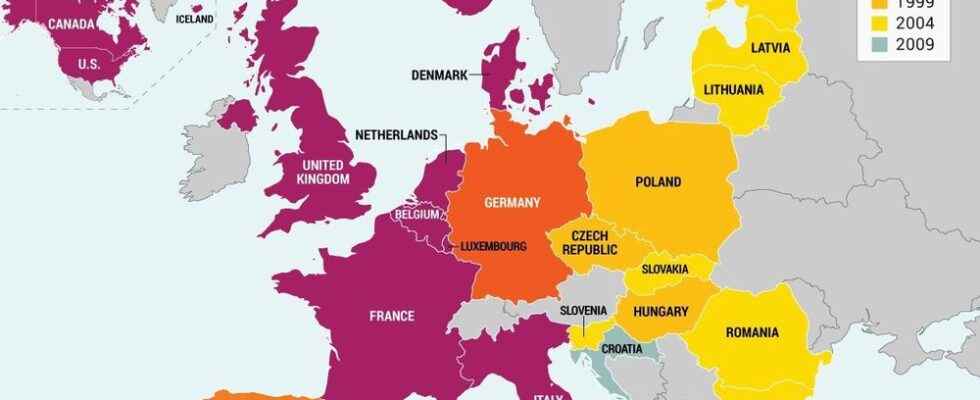Looking at Russia’s strategy in Ukraine, and its strategy vis-à-vis the United States, we find ourselves faced with a conundrum: are we heading for war or are we witnessing a great diplomatic game?
Initially, Moscow operated a relatively slow deployment of its forces along the Ukrainian border. She then seemed able to invade Ukraine with minimal resistance. But rather than attack, Russia engaged in a diplomatic confrontation with the United States, demanding that Ukraine never be admitted to NATO and that the organization restrict its military presence in Europe by ballast.
Members of NATO Europe, with year of membership
Geopolitical Futures
Russian negotiators knew from the start that the United States could never agree to such demands. On the one hand, this decision is up to NATO, not Washington. On the other hand, NATO members in the region are already precisely on the eastern border of the alliance. They are the most exposed to potential actions from Russia, and even more so if it seizes Ukraine. In short, giving in to Russian demands would leave Eastern Europe open to Russian attacks depending on the mood of the Kremlin.
For Washington, the most important thing is not to let its credibility be damaged, not only in the eyes of Europe but also of the rest of the world. No question, therefore, of authorizing the Russians to dictate to the United States its future relations with sovereign states, in Europe or elsewhere. The consequences of such weakness would be global and, in Washington, it would create a political crisis from which the American administration would be incapable of coping.
There is nothing logical in Russia delaying its military operations while formulating demands which it knows in advance to be unachievable, at a time when its armed forces are already deployed in the possible theater of operations. Why would Russia, if determined to enter and occupy Ukraine, give the West time to prepare military countermeasures?
Moscow has known from the start that its actions will be perceived as a threat because that is precisely what it seeks. She also knows that any military action on her part will engender a response; however, she is not able to accurately predict its nature. For example, the commitment of air and naval forces as well as the use of anti-tank weapons could considerably complicate its invasion plans.
At best, an invasion of Ukraine is difficult. Because the area of the country is roughly equivalent to that of Afghanistan. Moreover, coordinating a complex armored operation leaves the possibility open for a myriad of failures. However, the Russian army has not carried out an armored operation since the Second World War, which means that its troops lack experience in this area. Having to stem the rise of an anti-Russian front will in reality mean, for the assailant, having to face multiple risks. For an operation of such magnitude, the attack must take place as soon as possible, by surprise. By choosing to take its time, Russia only increases the likelihood of a fiasco.
Moscow did everything to create an atmosphere of crisis
The only logical conclusion to draw is that Russia has no intention of invading Ukraine, as Deputy Foreign Minister Sergei Ryabkov has repeatedly insisted. Given that Russia has failed to act when it could and should, perhaps he is telling the truth. Moreover, we have recently seen that the Russians can act more subtly, as is the case in Belarus, the Caucasus and Central Asia.
In Ukraine, Moscow has done everything to create an atmosphere of crisis. Perhaps she has information indicating that the United States and NATO are going to play other cards. In any case, the United States cannot afford the luxury of doing nothing. Threats from President Joe Biden against the Russian banking system are either far more devastating than I can imagine, or they are a smokescreen that simply hides military action. Which would mean that the United States is also playing reserve, but not as disconcertingly as the Russians.
In my opinion, the most likely is that the Russians made extreme demands because this is the basic principle of a normal negotiation strategy. The fact remains that the Russian forces are deployed on the ground and that, opposite, the resistance is strengthening. Perhaps the Russians are simply confident in their military superiority and the certainty of winning, even if they let time slip away, instead of taking action as soon as possible.
However, one of the rules of war imposes to attack when one is in a situation of maximum advantage and not to yield a millimeter in advance to the opposing camp. The rule of diplomacy is to threaten a lot before concluding an agreement. But at some point, between war and diplomacy, you have to choose, because you can’t do both at the same time.
American political scientist George Friedman, founder of Geopolitical Futures, an analysis and forecasting site devoted to international developments.
GF
* Born in Budapest in 1949, George Friedmanis the founder of Geopolitical Futures, geopolitical analysis and forecasting site. An American expert in the field of foreign affairs and intelligence, he has advised numerous governmental and military organizations in the United States and abroad. In 2015, George Friedman created Geopolitical Futures. Previously, in 1996, he founded Stratfor, an influential digital media also devoted to international affairs. Finally, George Friedman is the author of numerous books including the best-selling The Next 100 Years,published in 2009 and praised for the accuracy of its predictions.
